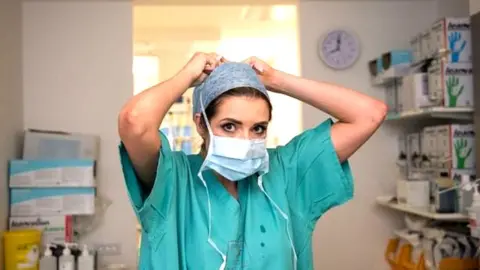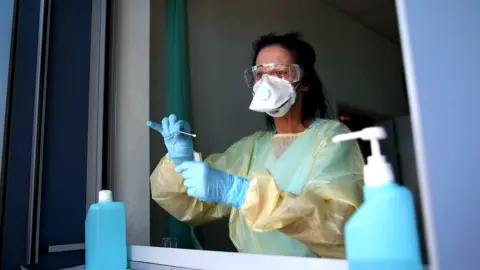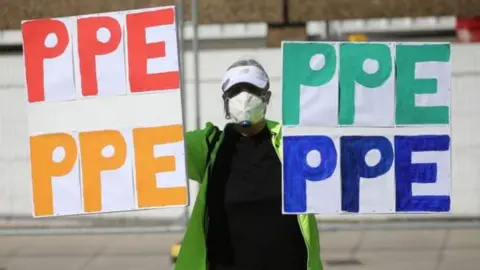RCN Scotland concerned about reported re-use of PPE
 Getty Images
Getty ImagesA nursing body has repeated its call for health workers to be given adequate protective equipment amid reports of single-use items being re-used.
The Royal College of Nursing (RCN) said more needs to be done on PPE (personal protective equipment).
Almost half of high-risk environment nurses responding to a survey said they had been asked to re-use single-use PPE.
The first minister said a dedicated email was available to raise concerns.
The RCN survey indicated 47% of those working in high-risk environments, who answered, had been asked to use PPE again.
The snapshot survey also found that 36% of nurses caring for patients with confirmed or potential Covid-19, but not involving high-risk procedures, had also faced the request.
RCN Scotland believes the current situation is leading to increased stress on nursing staff, many of whom said they felt pressured to care for a patient without appropriate PPE as outlined in current guidance.
 Getty Images
Getty ImagesMedical professionals have repeatedly raised concerns about supplies of personal protective equipment during the response to the coronavirus pandemic.
Public Health England on Friday changed its guidance on the re-use of PPE, saying it should be implemented as a compromised until adequate supplies are in place.
A week ago, doctors and nurses wrote to the Scottish government to express "grave concerns" about the protective equipment they have been given.
At her latest briefing, Nicola Sturgeon promised to look into claims made by health care workers worried about the supply of protective equipment.
She was told of a hospital nurse on a ward with coronavirus patients who said they had to go on shift with single-use PPE that had been worn by other nurses for three consecutive days.
'We will respond urgently'
The nurse described using hand sanitiser on paper towels to try to disinfect equipment.
The first minister responded: "I would remind any health care worker, we have set up a dedicated email address to email in if they feel they don't have the PPE they need or have concerns and we'll respond urgently."
Health Secretary Jeane Freeman said she was already aware of an issue with gowns being issued that were not right for that particular clinical setting.
 Getty Images
Getty ImagesTheresa Fyffe, director of RCN Scotland said the results of the survey underlined the pressures on nursing staff.
She said: "It's fundamental to personal safety and effective infection control that nursing staff have the correct PPE and that it fits properly.
"Incorrectly fitting PPE might not provide effective protection. It's also essential that they are trained in its proper use and have adequate changing and washing facilities.
"Our members are telling us this is not the case for everyone and the results support the concerns the RCN has been raising consistently during the pandemic."
She added: "The Scottish government has assured staff that a lot of hard work is being done to improve and secure supply, distribution and use of PPE. These results show that there is still more to do. It's time to make good on the promises that have been made to all nursing staff in the past few weeks."
Other findings from the survey were:
- 25% of respondents working in high risk environments (where procedures are carried out that may increase risk of transmission of infection) had not had their mask fit-tested
- 31% in these areas had not had training in putting on and taking off PPE
- 41% of respondents in all areas said they did not have access to suitable changing facilities
- 50% said they did not have access to suitable washing facilities, including showers.
The RCN, which represents 40,000 members in Scotland, said it was planning to repeat this survey on a regular basis to monitor how PPE and infection control change as the pandemic response continues.

- A SIMPLE GUIDE: How do I protect myself?
- AVOIDING CONTACT: The rules on self-isolation and exercise
- HOPE AND LOSS: Your coronavirus stories
- LOOK-UP TOOL: Check cases in your area
- VIDEO: The 20-second hand wash
- STRESS: How to look after your mental health

